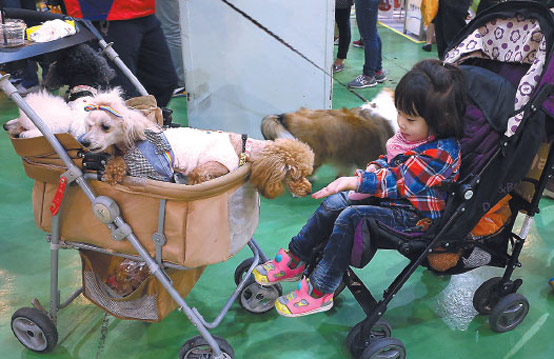Mars Petcare banks on consumer awareness to support its growth in China, says top executive
 |
|
A girl plays with her pets at an international pet products exhibition in Beijing. According to global market research firm Euromonitor International's forecast, China's pet food market is expected to grow to 5.13 billion yuan ($821 million) in 2017 from 3.6 billion yuan in 2014. [Photo provided to China Daily] |
Shifting demographics and spending patterns will weigh on profit margins of pet food makers in China, but the long-term prospects still remain bright, the top official of a leading global company said. Though China is already home to one of the world's largest pet populations, success in the niche market hinges on providing healthy and wholesome products for pets, which also calls for a certain level of knowledge about pet nutrition, said Carl Su, general manger of Mars Petcare China.
According to Su, there are three groups that require formula food - infants, astronauts and pets. Tackling the complex pet food market has been a big challenge in China compared with other developed-markets, he said, largely due to the lack of nutrition awareness.
Su said that about 97 percent of the Chinese pet owners still feed their pets with home-cooked food or leftovers. In addition, many Chinese consumers consider the simple mix of meat and vegetables as healthy food for pets.
However unlike humans, pets cannot gauge whether they have had enough or balanced nutrition for their growth. Excess nutrition or nutrition deficiency will both cause problems for pets, he said.
Su, the first Chinese general manger of Mars Petcare, the US-based pet food division of global confectionary major Mars Inc, says his primary responsibility in China is to boost awareness about whole-some nutrition.
"There is no doubt that all pet owners in China love their pets. But learning to look after them properly is something that requires professional knowledge," he said.
Mars Inc has 41 global pet food brands and products under its portfolio, including big names like Pedigree dog food, Whisk as cat food, Royal Canin, Cesar, Sheba, Kitekat, Chappi and Catsan.
Su said that he became aware of the lack of knowledge in China after gauging responses from other overseas markets. Pet owners in most of the overseas markets opted for comprehensive and balanced nutrition, while the same was relatively low in China.
"What was surprising was that in China, even the veterinarians did not give answers veering toward comprehensive, balanced nutrition," he said.
Adding to problems for companies has also been the relatively low pet food conversion rate in China, in single digits, compared with more than 85 percent in developed markets such as the United States and Europe.
Speaking on the advantages of food conversion for pets, Su said the shift to professional pet food will reduce early death in toddler cats and dogs by 50 percent, the risks of bone deformity by 100 percent and the chances of infective dental diseases by 40 percent.
Responsible and disease preventive feeding is crucial for good pet health, said Su. About 80 percent of the dogs above three years old often suffer from dental calculus. An introduction of a dental chew would help save the dog from being subject to painful dental cleaning, he said. "Prevention is better than the actual medical treatment," said Su.
As the world second-largest country in terms of the number of registered pets only after the US, China represents a huge opportunity for Mars, a market it entered 20 years ago.
The number of pets in China has increased nearly 900 percent to 120 million with in a decade since 2003. According to global market research firm Euromonitor International's forecast, the pet food market is expected to grow to $821 million in 2017 from $585 million in 2014.
